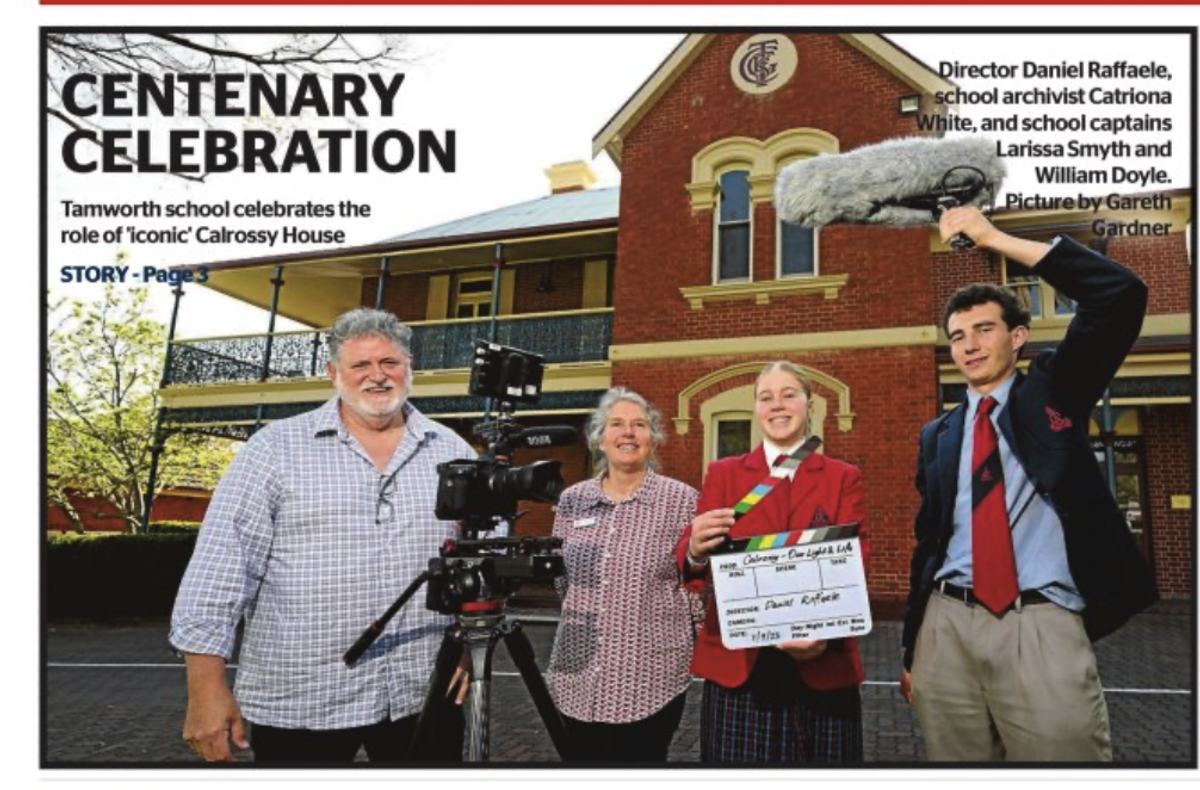Message from the Principal
Mr David Smith

Message from the Principal
Mr David Smith
I love the history and longevity of our School that we have been part of the Tamworth and North-West education scene for 104 years and are Tamworth’s oldest school. Our Centenary a few years back emphasised this, promoting an understanding of the ‘spirit’, culture and strength of the current day Calrossy that has been generated over time, through the input of many. The stories of the people involved and events over that time remain fascinating.
The Centenary reminded me that we are part of something much bigger than ourselves, that supports students in their education. The concepts of servant leadership and selflessness, the focus on growth, forgiveness and acceptance and the resilience of our students (past and present) all tie into our Christian character, nurtured as part of original vision of our founders.
Calrossy House (on Brisbane Street) was first purchased for use in 1923, four years after the foundation of the School and has been part of the beating heart of the school, in particular boarding, for 100 years. It has stood at the frontispiece of the School for a century. I am excited that this Friday evening we are premiering a video production, Calrossy .. Our Light and Life, specially made for this centenary, which celebrates this building and explores the School as it developed around it.


All members of the community are specially invited to the Premiere of this movie, to be shown at a function, commencing at 5 pm at the Capitol Theatre Tamworth this Friday September 15. Entry is $25, with the proceeds supporting the Calrossy Foundation in funding the Ruth Munro and Mary England Scholarships, to enable students to access education in our School. I have seen the preview and it is great viewing, telling stories from the early days and featuring important members of our community. It helps explain how Calrossy arrived as it is today, through many trials and tribulations.
Please do come and join our gala event which celebrates the history of our School, including the amalgamation with William Cowper Anglican School, and the different eras of change in Calrossy over the last 100 years. Tickets are available below.
I don’t want to sound ‘preachy’ or tell parents how to do their job, knowing that my role as Principal is to lead a school team to provide best outcomes for our students. However, with strategic goals of Learning in Partnership and Growing our People, a recent article I encountered on Parenting School aged children sparked my interest. The source is quoted at the end and the writer, Linda Stade, shares some positive yet provocative ideas on how parents and schools might work together to grow great kids.


We have all heard the terms ‘helicopter parent’, ‘bubble wrap parents’ or ‘lawnmowing parenting.’. Such terms are used to describe over-protective adults who swoop in and solve problems for their kids or who never allow a problem to emerge. The terms can be amusing…but they are over-simplifications which aren’t helpful. They don’t recognise that usually parents act according to our own fears, hopes, beliefs and values. They also neglect that every parent can be tempted to act this way at times.
There have been times as a teacher and Principal that I have had to gently remind parents to pull back a little and allow their children to own a specific situation. It is tricky as usually such responses come from places of love or fear.
So… when should parents step back? Linda Stade, internet columnist, makes the following suggestions on when parents should think carefully about their involvement:
We want kids to love sport. Sport will give kids health, teamwork, responsibility and a sense of endeavour. So, don’t be the parent who abuses the umpire. We need to teach children about fair play and respect for others.
The same goes for coaches. We need to support them rather than undermining them. Perhaps instead of swooping in, ask yourself, “Why does this matter so much to me?”
US Novelist Nancy Star goes as far as saying that parents should never speak when it comes to sport. She says that if you don’t speak, if you avoid the clichés and the platitudes and just say nothing, they will eventually speak to you… calmly. Bearing silent witness gives your child space to think and talk. It’s possible that adults speak altogether too much.
2. When your child doesn’t get the results you want
Yes, we want kids to do their best, but not many children are successful in everything. For some children their success might be that they love learning or are involved in lots of activities and socialise well. Stade suggests that we congratulate our child on their awesome efforts in the areas where they worked really hard. Don’t rely on a very narrow definition of success. Help children to plan for achievable improvement in the areas where they struggle or haven’t really applied themselves.
A child not getting an award on Presentation Day is not a sign that they haven’t done a good semester’s work and it’s not a signal that we haven’t done a good job as a parent. Don’t let comparisons with others undermine what we know is important.
3. When your child is in conflict with another student
Nothing is as hard as when a child is having friendship problems. For a while, it permeates every part of their life. Most students go through this and every parent wishes they could take away the pain. However, picking up the phone to call the other child’s parent, or marching down to school rarely helps.
Remember, if we vanquish all the dragons, we also vanquish the dragon-slayer. Stade says that we should acknowledge that conflict and rejection feel terrible. She suggests that we validate our child’s feelings and ask, “What’s your plan?” If they haven’t got one, “That’s okay, we’ll figure it out together.” Give them the skills and support they need to face the challenge themselves as much as possible. Of course, there is awful behaviour of others that must be called out. Let school know calmly as high anxiety is not normally the best context to seek solutions. Also be aware that our own child’s representations can be subjective and coloured.
4. When your child is in trouble at school
It is the rare child who has not been spoken to at school from time to time. It happens. Kids are human and they get things wrong. That’s okay, but they need to learn that their choices have consequences. Please support teachers, or at least, don’t undermine them.
Our School is committed to ‘learning in partnership’ so working with parents is vital to this. Research shows that parents who work with teachers, rather than against them, will see better outcomes for their child, socially and academically. Positive relationships between home and school will work for good.
5. When your child is continually relying on you instead of learning
It’s nice to be needed; however, when we continually do tasks for our child instead of gradually assisting them to take responsibility for themselves, we do them no favours. Students learning to take responsibility in an age-appropriate manner is best for them.
Finally…
Stepping back doesn’t mean disengaging. It means creating space for our child. It’s hard to do, but they need that space to grow and they need experiences and mistakes from which to learn. Most importantly they need us to be on the other side of the space, teaching and supporting them.
The original version of this article, (which I have cut down and amended) can be found via https://lindastade.com/over-protective-parents/ Linda Stade has other helpful (in my view) advice articles for parents and teachers on her website and blogs https://lindastade.com
David Smith
Principal